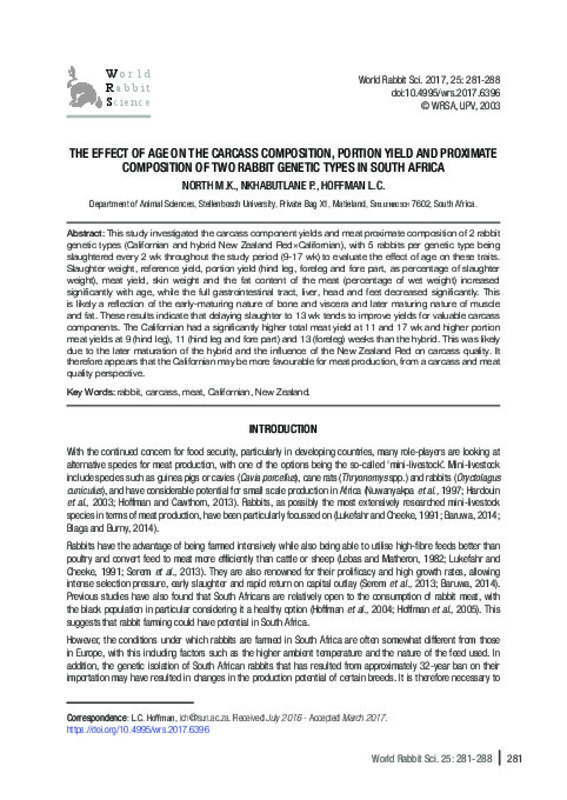JavaScript is disabled for your browser. Some features of this site may not work without it.
Buscar en RiuNet
Listar
Mi cuenta
Estadísticas
Ayuda RiuNet
Admin. UPV
The effect of age on the carcass composition, portion yield and proximate composition of two rabbit genetic types in South Africa
Mostrar el registro sencillo del ítem
Ficheros en el ítem
| dc.contributor.author | North, M.K.
|
es_ES |
| dc.contributor.author | Nkhabutlane, P.
|
es_ES |
| dc.contributor.author | Hoffman, L.C.
|
es_ES |
| dc.date.accessioned | 2017-09-29T09:01:42Z | |
| dc.date.available | 2017-09-29T09:01:42Z | |
| dc.date.issued | 2017-09-28 | |
| dc.identifier.issn | 1257-5011 | |
| dc.identifier.uri | http://hdl.handle.net/10251/88259 | |
| dc.description.abstract | [EN] This study investigated the carcass component yields and meat proximate composition of 2 rabbit genetic types (Californian and hybrid New Zealand Red×Californian), with 5 rabbits per genetic type being slaughtered every 2 wk throughout the study period (9-17 wk) to evaluate the effect of age on these traits. Slaughter weight, reference yield, portion yield (hind leg, foreleg and fore part, as percentage of slaughter weight), meat yield, skin weight and the fat content of the meat (percentage of wet weight) increased significantly with age, while the full gastrointestinal tract, liver, head and feet decreased significantly. This is likely a reflection of the early-maturing nature of bone and viscera and later maturing nature of muscle and fat. These results indicate that delaying slaughter to 13 wk tends to improve yields for valuable carcass components. The Californian had a significantly higher total meat yield at 11 and 17 wk and higher portion meat yields at 9 (hind leg), 11 (hind leg and fore part) and 13 (foreleg) weeks than the hybrid. This was likely due to the later maturation of the hybrid and the influence of the New Zealand Red on carcass quality. It therefore appears that the Californian may be more favourable for meat production, from a carcass and meat quality perspective. | es_ES |
| dc.description.sponsorship | The authors would like to thank Gail Jordaan from the Department of Animal Sciences at Stellenbosch University for performing the statistical analysis of the data. This work is based on research supported by the South African Research Chairs Initiative of the Department of Science and Technology and the National Research Foundation of South Africa. Any opinion, finding and conclusion or recommendation expressed in this material is that of the author(s) and the National Research Foundation does not accept any liability in this regard. | |
| dc.language | Inglés | es_ES |
| dc.publisher | Universitat Politècnica de València | |
| dc.relation.ispartof | World Rabbit Science | |
| dc.rights | Reserva de todos los derechos | es_ES |
| dc.subject | Rabbit | es_ES |
| dc.subject | Carcass | es_ES |
| dc.subject | Meat | es_ES |
| dc.subject | Californian | es_ES |
| dc.subject | New Zealand | es_ES |
| dc.title | The effect of age on the carcass composition, portion yield and proximate composition of two rabbit genetic types in South Africa | es_ES |
| dc.type | Artículo | es_ES |
| dc.date.updated | 2017-09-29T07:00:23Z | |
| dc.identifier.doi | 10.4995/wrs.2017.6396 | |
| dc.rights.accessRights | Abierto | es_ES |
| dc.description.bibliographicCitation | North, M.; Nkhabutlane, P.; Hoffman, L. (2017). The effect of age on the carcass composition, portion yield and proximate composition of two rabbit genetic types in South Africa. World Rabbit Science. 25(3):281-288. https://doi.org/10.4995/wrs.2017.6396 | es_ES |
| dc.description.accrualMethod | SWORD | es_ES |
| dc.relation.publisherversion | https://doi.org/10.4995/wrs.2017.6396 | es_ES |
| dc.description.upvformatpinicio | 281 | es_ES |
| dc.description.upvformatpfin | 288 | es_ES |
| dc.type.version | info:eu-repo/semantics/publishedVersion | es_ES |
| dc.description.volume | 25 | |
| dc.description.issue | 3 | |
| dc.identifier.eissn | 1989-8886 | |
| dc.contributor.funder | National Research Foundation, South Africa | |
| dc.contributor.funder | Department of Science and Innovation, South Africa |








